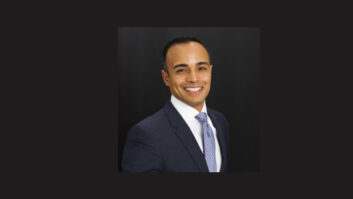A year that began with the retirement of NAB head and Washington fixture Eddie Fritts will soon end with the departure of Bill Frist, Senate Majority leader, along with many of his congressional colleagues. The departures of both Fritts and Frist were planned, but most of the latter’s fellow members were voted out, taking with them the Republican control of Congress.
Both of these shifts in the nation’s capital could have significant impact on the broadcasting industry as 2007 dawns. In fact, the new NAB President/CEO David Rehr has already begun to make his mark, with every appearance that it’s not your father’s NAB anymore.
Meet the new boss …
Although Eddie was a tough act to follow — having brought NAB from an also-ran to one of the most powerful lobbying forces on the planet over his 23-year tenure — Rehr has roared out of the box, providing much-needed vigor to the primary advocate of an industry searching for new relevance.
While the broadcast lobby remains a force to be reckoned with in D.C., the resonance of digital revolution echoes louder through the marble halls each year, and old voices easily can be lost. Thus it’s helpful and timely to have broadcasters’ concerns carried with fresh and effective expression.
Rehr’s background is well known; he came not from broadcasting but from one of its biggest advertisers, the beer industry. He doesn’t shy from this label but has turned his outsider nature into an asset during his early work at NAB. His speeches emphasize his own admiration of the broadcast industry, even as he learns about it. This approach highlights things that broadcasters themselves may not even notice anymore, but when they are compared to other industries, provide much to be proud of — and to take credit for.
Privately, Rehr notes that his college years did indeed include a stint on the radio, at no less prestigious a venue than KSJR(FM), Collegeville, Minn., where Garrison Keillor and “A Prarie Home Companion” also got their start. Rehr’s road had no further stops in the broadcast biz, but now he’ll use his considerable talents to carry the flag for U.S. broadcasters as they continue to remain vital in the digital age. If you haven’t yet met or heard David Rehr speak, take your first opportunity to do so — you’ll be happy you did.
Same as the old boss?
Meanwhile, the full impact of changes to the U.S. Congress is still being assessed. As committee and subcommittee leaderships and memberships are settled, broadcasters will be most closely focused on the key venues of Commerce (where the telecom reform battle will re-engage) and Judiciary (where Copyright reform discussions will continue).
But it is hard to predict how these changes will affect resulting legislation, especially on the issues of concern to broadcasters. For one thing, the slimmest of majorities exists for the Democrats — particularly in the Senate — so when it comes to final passage of bills, the 110th Congress will likely never stray far from complete parity (read “total gridlock”). The development of legislative language happens upstream at the committee level, however, where individual members can have more sway, and party leadership holds greater impact.
Yet here, too it is a tough call, since most of the issues on legislative agenda that broadcasters care about are not divided along clear party lines. They are more constituency-driven, but with today’s increasingly diverse economy and demography in many U.S. regions, even this metric is not always definitive. Incoming Speaker of the House Nancy Pelosi is a case in point: She hails from California, so one might think she will be friendly to the content communities of Hollywood (movies and music) in the copyright wars, but her home district is actually in Northern California, where Silicon Valley and related electronics industry constituents might push her to the other side in that debate. Thus the layers of obfuscation run deep on handicapping the 110th Congress.
Some things never change
Of course, the 2006 election had only indirect impact in the executive branch, where the FCC lives. In fact, Kevin Martin was recently reconfirmed as chairman for the last two years of the Bush administration. It seems hard to believe he has already served as chairman for that long, since not much has been accomplished — although in fairness, for much of that time the commission was not at full strength. Now it is, and its membership is arguably both as smart and diverse in its views as any in recent memory. This is a good thing, but it also means that gridlock may be hard to avoid there, as well.
Yet if Martin is to make any mark as chairman, he will need to do so in the next two years (quite likely his last chance), so perhaps we may see some improvement in commission output during this time. Martin is fairly broadcaster-friendly at heart, but non-broadcast issues have taken up most of the cycles at the FCC to date, and this is unlikely to change soon. There also seems to be a recent reluctance at the FCC to push too hard on controversial issues, given rebuffs from the courts (e.g., Broadcast Flag) and the industry (e.g., cable à la carte) that have greeted some recent initiatives. Martin is also said to be keeping a fairly tight and unilaterally authoritative rein on proceedings, a significant departure from his predecessor.
Nevertheless, he is rumored to have his sights on elected office in his home state of North Carolina following his FCC tenure, so Martin may be even more predisposed to keep broadcasters happy. For many — particularly in radio — holding the status quo may do just that. So on balance, don’t look for any monumental changes on the broadcast regulatory front in the next two years.
As broadcasters contemplate the sunset of the Bush presidency and their industry’s future, prospects seem complex and unclear. The players have certainly changed, but whether the outcome is any different remains to be seen.












